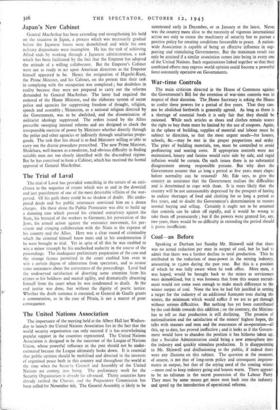The Trial of Laval
The trial of Laval has provided something in the nature of an anti- climax to the sequence of events which was to end in the downfall and just punishment of one of the most detestable villains of the war- period. Of his guilt there could be no shadow of doubt. His undis- puted deeds and his public utterances convicted him on a dozen charges. On these alone the Public Prosecutor was able to build up a damning case which proved his criminal conspiracy against the State, his betrayal of the workers to Germany, his persecution of the Jews, his armed action against the resistance movement, his per- sistent and cringing collaboration with the Nazis at the expense of his country and the Allies. Here was a clear record of criminality which the criminal himself knew must end in his condemnation if he were brought to trial. Yet in spite of all this he was enabled to win a minor triumph by his unchecked audacity in the course of the proceedings. The inadequate preliminary preparation of the case and the strange licence permitted in the court enabled him even to win a certain degree of admiration from spectators, and to arouse some uneasiness about the correctness of the proceedings. Laval had the undeserved satisfaction of diverting some attention from his crimes to his boldness and mental agility, and dramatically absenting himself from the court when he was condemned to death. At the end justice was done, but without the dignity of poetic justice. Whether the death sentence is executed, or General de Gaulle grants a commutation, as in the case of Petain, is not a matter of great consequence.


























 Previous page
Previous page